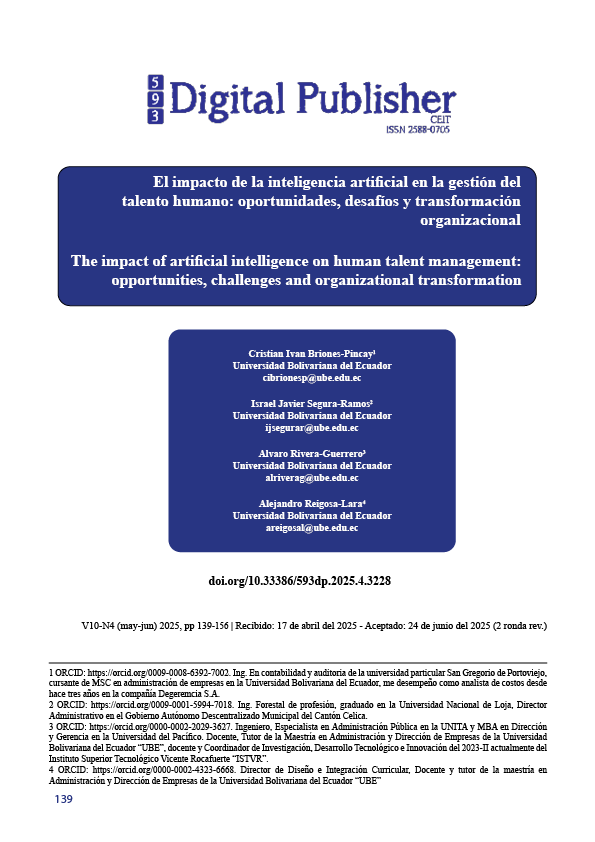El impacto de la inteligencia artificial en la gestión del talento humano: oportunidades, desafíos y transformación organizacional
Contenido principal del artículo
Resumen
El artículo tiene como objetivo Analizar el impacto de la Inteligencia Artificial (IA) en la gestión del talento humano, con un enfoque particular en las oportunidades, desafíos y la transformación organizacional. La metodología usada fue descriptiva, bibliográfica documental con enfoque cualitativo en una revisión sistemática y el uso de fuentes secundarias como artículos científicos, libros, y demás información relevante sobre la temática en cuestión. Entre los resultados demostró la revisión sistemática de 73 artículos con exclusión mediante cribado dio como resultado 22 artículos. Las ocho investigaciones finales seleccionadas, tienen principal característica que se ubican entre el 2022 al 2024, notando una mayor profundización sobre el tema vinculado entre el talento humano y la incorporación de la IA en su gestión, dando paso a la transformación organizacional. Entre las conclusiones del ensayo se puede determinar que la inteligencia artificial está transformando la gestión del talento humano al brindar herramientas poderosas que optimizan procesos clave como el reclutamiento, la selección, la capacitación y el desarrollo organizacional. Al automatizar tareas repetitivas, las empresas pueden asignar sus recursos humanos a funciones más estratégicas, mientras que la personalización de estrategias mediante IA permite decisiones más informadas y una experiencia laboral enriquecida para los empleados.
Descargas
Detalles del artículo

Esta obra está bajo una licencia internacional Creative Commons Atribución-NoComercial-CompartirIgual 4.0.
1. Derechos de autor
Las obras que se publican en 593 Digital Publisher CEIT están sujetas a los siguientes términos:
1.1. 593 Digital Publisher CEIT, conserva los derechos patrimoniales (copyright) de las obras publicadas, favorece y permite la reutilización de las mismas bajo la licencia Licencia Creative Commons 4.0 de Reconocimiento-NoComercial-CompartirIgual 4.0, por lo cual se pueden copiar, usar, difundir, transmitir y exponer públicamente, siempre que:
1.1.a. Se cite la autoría y fuente original de su publicación (revista, editorial, URL).
1.1.b. No se usen para fines comerciales u onerosos.
1.1.c. Se mencione la existencia y especificaciones de esta licencia de uso.
Citas
Abdulrahman, W. (2023). The Power of Artificial Intelligence in Recruitment: An Analytical Review of Current AI-Based Recruitment Strategies. Journal of Professional Business Review, 8(6), 1-25. doi:10.26668/businessreview/2023.v8i6.2089
Alarcón, C., & Hernández, V. (2024). Modelos de gestión de talento humano. Análisis crítico. Revista ECOCIENCIA, 11(1), 1-17. doi:10.21855/ecociencia.111.847
Alles, M. (2019). Desarrollo del talento humano. Ediciones Granica.
Baublys, G. (2020). Organization’s Proactive Transformation Competence: Identification and Development. European Conference on Innovation and Entrepreneurship. Vilnius: Reading. doi:10.34190/EIE.20.088
BDM. (24 de Mayo de 2024). Últimas estadísticas del uso de la IA en las empresas. Obtenido de Redacción BDM: https://bigdatamagazine.es/ultimas-estadisticas-del-uso-de-la-ia-en-las-empresas/#:~:text=El%2075%25%20de%20los%20%E2%80%9CKnowledge,de%20su%20trabajo%20(83%25).
Becerra, G., & López, J. (2021). Representaciones sociales del big data y la inteligencia artificial. Una exploración estructural. Cultura y representaciones sociales, 16(31), 0009.
Canossa-Montes de la Oca, H., & Peraza-Villarreal, N. (2023). Gestión del talento humano en la era de la inteligencia artificial: retos y oportunidades en el entorno laboral. 593 Digital Publisher CEIT, 9(1), 302-319. doi:10.33386/593dp.2024.1.2170
Castillo, J. (2020). Gestión humana integral. 1ra edición. Ecoe Ediciones.
Chaieb, S., Garrouch, K., & Sulaiman Al-Ali, N. (2023). Perceptions of the use and benefits of artificial intelligence applications: survey study. Journal of Medical Artificial Intellegence, 6(1), 1-12.
Chávez, R., Estrada, J., & Guerra, K. (2024). Desafíos de la inteligencia artificial en la Gestión del Talento Humano. GADE: Revista Científica, 4(3), 190-206. Obtenido de revista.redgade.com/index.php/Gade/article/view/464
Collins, C., Dennehy, D., Conboy, K., & Mikalef, P. (2021). Artificial intelligence in information systems research: A systematic literature review and research agenda. International Journal of Information Management, 60(1), 25-36. doi:10.1016/j.ijinfomgt.2021.102383
Conrero, S., & Cravero, V. (2019). El talento humano en las organizaciones. Claves para potenciar su desarrollo. Editorial Universidad Católica de Córdoba.
Davenport, T. (2019). The AI Advantage. How to Put the Artificial Intelligence Revolution to Work. MIT Press.
Diario TI. (6 de Julio de 2023). La inversión en IA se prevé alcance los 154.000 millones de dólares al cierre de 2023, según IDC. Obtenido de Web site de Diario TI: https://diarioti.com/42-de-las-empresas-en-latinoamerica-han-incorporado-inteligencia-artificial-en-sus-procesos/123099
Duan, Y., Edwards, J., & Dwivedi, Y. (2019). Artificial intelligence for decision making in the era of Big Data – evolution, challenges and research agenda. International Journal of Information Management, 48(1), 63-71. doi:10.1016/j.ijinfomgt.2019.01.021
Elbadawi, M., Li, H., Basit, A., & Gaisford, S. (2024). The role of artificial intelligence in generating original scientific research. International Journal of Pharmaceutics, 652(5), 123741. doi:10.1016/j.ijpharm.2023.123741
Erduran, S., & Levrini, O. (2024). The impact of artificial intelligence on scientific practices: an emergent area of research for science education. International Journal Science Education, 46(18), 1982-1989. doi:10.1080/09500693.2024.2306604
Eurostat. (1 de Enero de 2025). Uso de la inteligencia artificial en las empresas. Obtenido de Eurostat. website of the European Union: https://ec.europa.eu/eurostat/statistics-explained/index.php?title=Use_of_artificial_intelligence_in_enterprises&action=statexp-seat&lang=es
Fierro-Celis, F. (2020). Cambio organizacional: un modelo que dinamiza la transformación. Revista Escuela de Administración de Negocios, 1(88), 13-31. doi:10.21158/01208160.n88.2020.2560
Gómez, P. (2021). El cambio y su impacto en las organizaciones. ACADEMO, 8(2), 213-220. doi:10.30545/academo.2021.jul-dic.10
Jara, M., Recalde, L., Jara, J., Cadena, D., Rodríguez, R., & Ortega, Y. (2024). Gestión del cambio organizacional, a través del liderazgo transformacional. South Florida Journal of Development, 5(4), e3870. doi:10.46932/sfjdv5n4-019
León, B., Arroyo, L., Vargas, A., & Reigosa, A. (2024). Inteligencia artificial para los procesos de Gestión del Talento Humano. Dominio de las Ciencias, 10(4), 182-203. doi:10.23857/dc.v10i4.4057
León, O., Caraguay, J., & Ruiz, R. (2024). Evolución de la Inteligencia Artificial y su impacto en la Educación: Revisión de la literatura. Revista De Investigación Científica TSE DE, 7(1), 1-10. doi:10.60100/tsede.v7i1.195
Murugesan, U., Subramanian, P., Srivastava, S., & Dwivedi, A. (2023). A study of Artificial Intelligence impacts on Human Resource Digitalization in Industry 4.0. Elsevier, 7(1), 100249. doi:doi.org/10.1016/j.dajour.2023.100249
ODD. (31 de Enero de 2024). Empresas de IA en países América Latina y el Caribe en 2023. Obtenido de Observatorio de Desarrollo Digital de la Organización de las Naciones Unidas: https://desarrollodigital.cepal.org/es/indicador/02-empresas-de-ia-paises-america-latina-y-el-caribe-2023
OIT. (17 de Mayo de 2023). Inteligencia artificial y gestión de talento humano: Avances y desafíos. Obtenido de Organización Internacional de Trabajo. OIT/Cinterfor Notas: https://www.oitcinterfor.org/sites/default/files/file_publicacion/Nota%2017%20IA_GH_Cinterfor_0.pdf
Sharma, S. (2024). Benefits or concerns of AI: A multistakeholder responsibility. Futures, 157(1), 103328. doi:10.1016/j.futures.2024.103328
The New York Times. (2019). Artificial Intelligence. Rosen Publishing.
Truby, J. (2020). Governing Artificial Intelligence to benefit the UN Sustainable Development Goals. Sustainable Development, 28(4), 946-959. doi:10.1002/sd.2048
Tuffaha, M. (20 de Junio de 2022). Adoption Factors of Artificial intelligence in Human Resource Management. Obtenido de Tesis de Doctorado. Universitat Politècnica de València: https://m.riunet.upv.es/bitstream/handle/10251/185909/Tuffaha%20-%20Adoption%20Factors%20of%20Artificial%20intelligence%20in%20Human%20Resource%20Management.pdf?sequence=1&isAllowed=y
World Economic Forum. (2023). Future of Jobs Report. World Economic Forum.





